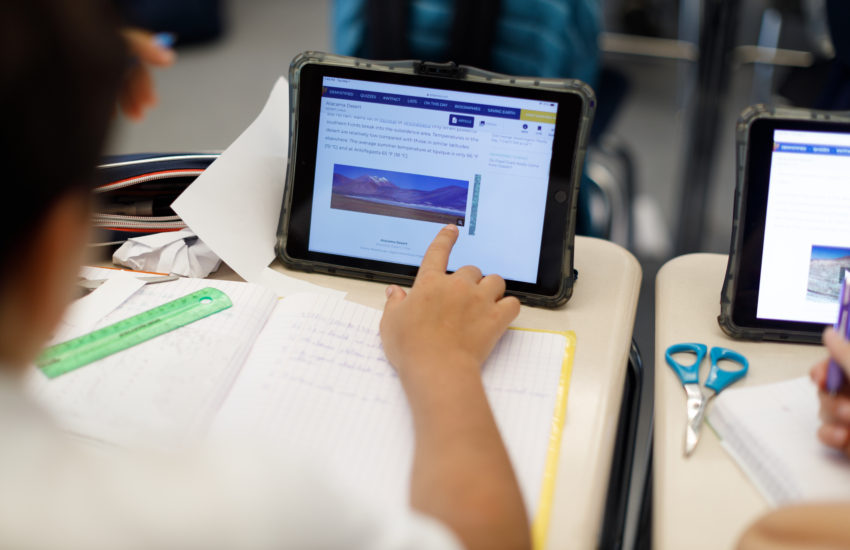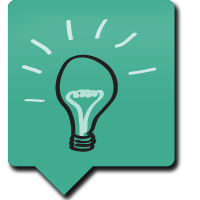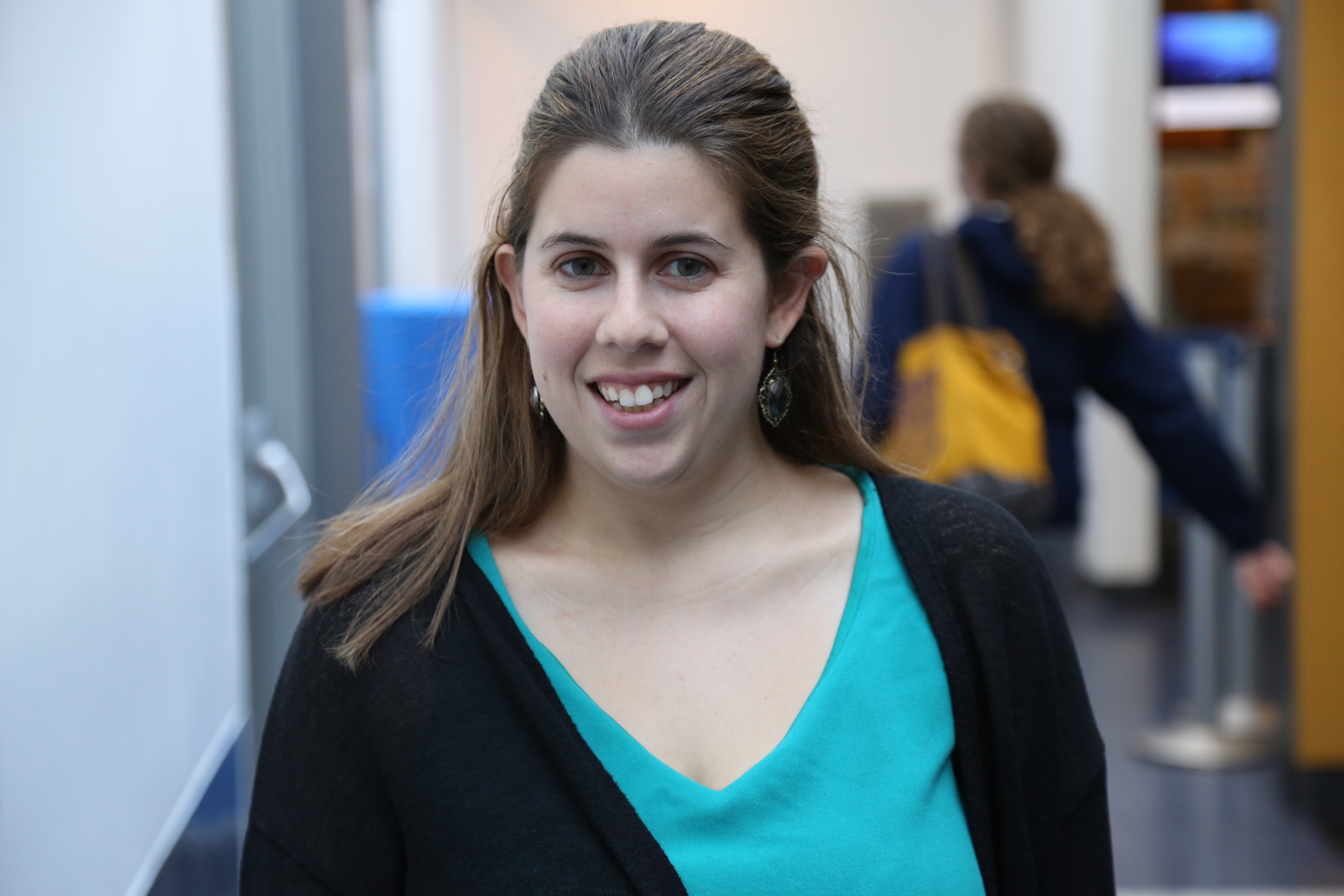Each trimester this year, the Head of School is organizing a breakfast with the APL in which he, the executive team and faculty members are addressing an important theme regarding the school’s program and answering any related questions parents may have. On Thursday, January 16, the subject of the conversation was the role of technology in education. I had the privilege of sharing the Lycée’s vision for using technology to enrich learning. This vision frames learning as the ultimate priority, with technology used to support the learning process. We feel strongly that technology should not take the place of human interaction, hands on exploration or discovery of the natural environment. Rather, technology should be used, when appropriate, to complement these learning experiences.
As the Director of Secondary, Nicolas L’Hotellier, reminded us all during the breakfast meeting, “Technology has the potential to revolutionize the way we teach, in particular, in how we use class time with students. We don’t want to throw out the old, but rather embrace and incorporate all the exciting learning possibilities offered by technology.”
Appealing to students with different learning styles
Our vision is ultimately that our students and our graduates are prepared to thrive in the ever-changing world in which we live. To concretize this vision, we are developing three main areas of focus: personalized learning, 21st century skills and digital citizenship. First, one of the greatest promises of the integration of new technologies is the ability for teachers to tailor learning experiences to student needs and interests. Tools such as Google Forms and Infuse Learning can shorten the feedback loop between assessment and instruction, allowing a teacher to address students immediately when they require remediation and to provide extension activities when students are ready to learn more. Lessons can be created to be multi-sensory and interactive, appealing to students with different learning styles.
The one device per student model
In order to implement such an environment, students and teachers will need access to devices. The Lycée currently provides classroom carts of Macbooks and iPads and computer labs for students and faculty. In order to fully provide a learning environment in which all students can access devices when they need them, we are looking toward a one device per student model, and, we are looking toward the benefits of online platforms to provide uninterrupted learning in the case of school closures or student absence. Second, our information rich, globally connected world requires the Lycée to emphasize a skillset that allows for students to be analytical, expressive, cooperative and reflective. For this reason, we are using “5 C’s” to frame the development these skills. The 5 C’s are: Communication, Collaboration, Creativity, Critical Thinking and Contemplation.
A place for reflection and mindfulness
The first “4 C’s” are part of the larger 21st Century Skills Framework, and the 5th “C”, contemplation, was added by the Lycée in order to remind us about the importance of reflection and mindfulness.
Computer programming offers students a unique approach to problem solving.
Learners in the 21st century also require some level of familiarity and comfort with computer science. The Lycée has already put an emphasis on computer science through the development of a new 5ème informatique curriculum, providing two new computer programming clubs this year and participating in world-wide Computer Science Education Week. Our plan is to do more, to build a computer science curriculum that spans the entire Lycée, from MS-Tle, and to increase the number of clubs with a focus on computer science and technology. We see computer science and programming as tools to nurture creativity. “Computer languages are evolving all the time, but what doesn’t change is the unique perspective and approach to problem solving that computer programming can foster in students,” added Nicolas L’Hotellier.
Balance online and offline activities
Last, we cannot expect our students to become 21st century learners without an understanding of how to be model citizens when using digital media. We expect our students to protect their own private information, respect themselves (through being safe) and others (by avoiding hurtful speech/actions), adhere to copyright law and balance their time between online and offline activities. In order to educate students in this arena, we have implemented curricular units through informatique and advisory, and we have amended the règlement intérieur with clear expectations regarding social media use. We are in the process of creating a committee in which students faculty, staff and parents will work together to review and advise on our digital citizenship policy and education efforts. The ultimate goal is to provide digital citizenship modules from cycle 3 – 2nde.
A partnership between the school and the parents
To transform this entire vision into a reality, the Lycée has made some significant organizational and infrastructure changes. First, the Digital Learning Department was created in order to drive this vision forward through curriculum development, teacher training and working directly with students integrating technology. Second, the IT team has upgraded the wireless network to support the use of devices. Last, we have developed new models for professional development in order to support our faculty. The team of presenters appreciates the opportunity to converse with parents about these important topics. The partnership between the Lycée and parents will be essential as we move forward together in supporting our students as they learn and grow. Read more about this topic: – La Génération E, by Vannina Boussouf, Director of Primary – 3-6-9-12, by Sean Lynch, Head of School
Images from InfuseLearning.com
About the Author :
Originally from Scranton, Pennsylvania, Adena Dershowitz is Head of Middle School. She began working at the Lycée as the secondary technology integrator in early 2012 and became Director of Digital Learning in 2014 and then Director of Curriculum Development in 2018. Adena earned a master’s degree in education and technology from the Harvard Graduate School of Education, and a bachelor’s degree from the University of Maryland. Prior to her work at the Lycée, she worked to infuse technology into informal (afterschool and camp) education. In her spare time, she likes to travel, experience the outdoors and make things.




